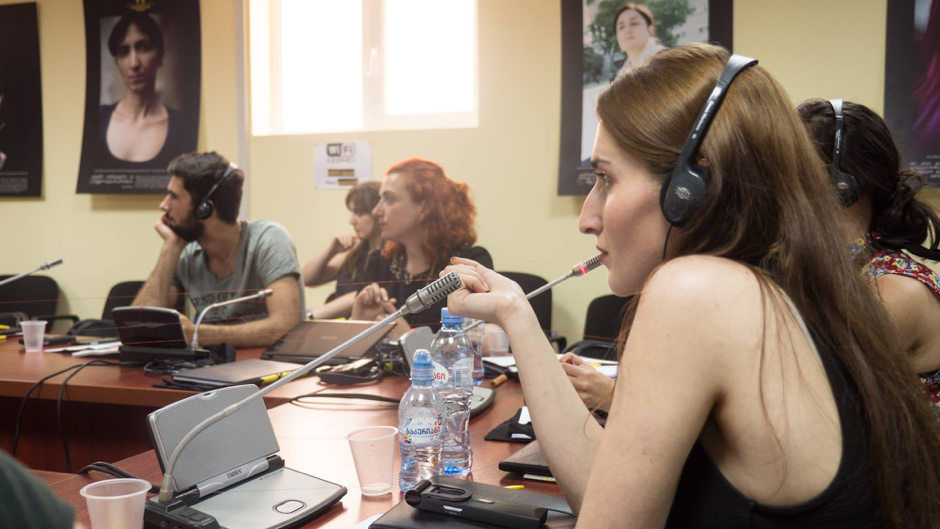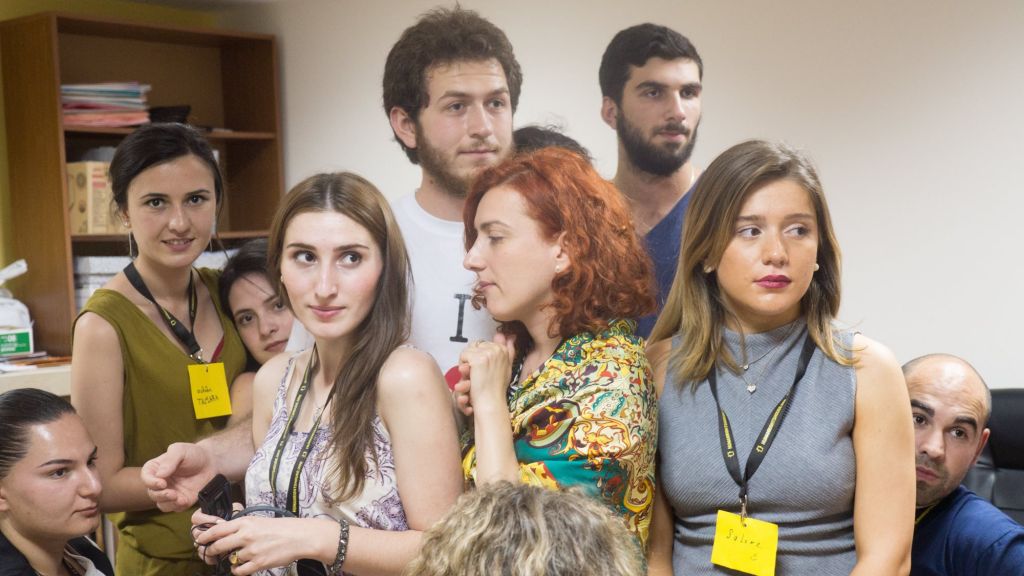These defenders helped to build the students’ knowledge and understanding of human rights.
The participants, trainers, and organisers reflect on the summer school, including their motivation and expectations, and the benefits of practical training led by human rights defenders and civil society.
Belarusian human rights defenders Andrei Paluda, Viasna, and Aleh Aheyeu, Belarusian Association of Journalists, introduced the concept of human rights, built familiarity with the most important human rights documents, and fostered discussion on different rights – from economic and cultural to political and civil.
Elena Fileeva, Article 42, and Tamar Avaliani, Human Rights Center, both defenders from Human Rights House Tbilisi, put this in the context of Georgia, discussing rights and obligations, and explaining the law in Georgia with regards these rights. Significantly, they shared their first-hand experience of working on human rights violations and with the implementation of rights in Georgia.
The 16 students attending expressed their motivations to join the training, and their expectations. Some already worked for NGOs and wanted to further their practical knowledge, or they studied law and saw it as an extension of their studies and a possible direction for their professional life, while some participants worked or studied in associated fields, such as in journalism. Others did not have a traditional connection to human rights, studying economics or psychology, but what they all shared was a strong personal interest in learning more about human rights and how they work in practice.
One of the students spoke of having observed a difference between human rights treaties and what actually happens in practice, and that their aim for the training was to know how human rights work in reality, not just how they are written in the constitution. They commented, where better to learn than from human rights defenders who work against human rights violations each and every day.
The summer school placed an emphasis on the two-way exchange of ideas and knowledge. Speaking on being a Belarusian trainer at a Georgian summer school, Andrei Paluda said that human rights are universal, so are applicable everywhere, with the differences lying in implementation. He emphasised the sharing of experience, with civil society in Belarus being sophisticated from years of challenging the government and having this experience to offer, while Georgia is at a later stage, so Belarusians can learn from Georgians about the systems that Belarus could hopefully transition to in the future.

Laura Shubitidze, sharing her expectations of the human rights school.
Click for more photos from the Human Rights Summer School.
Through interactive sessions, those without prior experience were quickly introduced to human rights, while those who have studied human rights were able to discuss what they have learned largely in theory with those who put it into practice each and every day. The participants also learned from one another, not just from the experts. And as said by the trainers, they also learnt from the students.
Trainer Aleh Aheyeu said of the training, it aimed “to make people realise the value of human rights and the fact that human rights are not detached from real life.”
Examples of how rights are implemented – and in some cases violated – in Georgia brought the discussion and the rights discussed to life in the room. It gave the rights substance, taking them from concepts to the essential real-life protections people need to live freely and with dignity.
The training educated the students not just on the rights they themselves enjoy and can defend, but also on their obligations, to ensure they to do not infringe on the rights of others. In one such emotive example, the students were divided into two groups. One group was assigned the role of migrants, the others as those in a prosperous country set to receive them. The migrants were tasked with convincing the others to let them stay while the others were given a set of rules governing how they would interact with anyone coming into their country.

“Migrant students” stand uncomfortably amid the unmoving positions of those already living in the prosperous host country, as part of a practical exercise on tolerance and equality.
This practical example, and several others to tackle discrimination and promote tolerance and equality, had a strong impact on the students. Many questioned how they had approached the situation and reflected on how this situation would be in real life, and understood the need for communication and flexibility from both parties in such situations.
It was this feeling as well as learning human rights that gave the sessions impact – and which made it easy for the students to relate to the message.
Speaking after such exercises, one of the students said: “I like that I had a view at the beginning of the exercise, and after I change my position. That is what I get from today.” Another spoke of having had many emotions during the exercises.
As with many aspects of the training, the emotions provoked were then built upon, moving into discussing discrimination, for example, from the perspective of international standards, and then legislation and its implementation at the national level.
Another student said they had started to think about things that they were not thinking about before, and that they had started to relate the examples with the human rights understanding from the previous day of the training.
Reflecting on such projects in human rights education, Andrei Paluda said: “You see sometimes a person feels some kind of injustice, that their human dignity or self-esteem were violated… but they do not fully realise this is about human rights. But when the person receives related information during educational activities, they immediately begin to realise, ‘Ah, here you go, it was about human rights.”
The summer school was a pilot project for Human Rights House Tbilisi and its member organisations in human rights education. Following its success, the House plans to take further steps in this direction.
Human rights education at Human Rights House Tbilisi
The summer school was a pilot project for Human Rights House Tbilisi and its member organisations in human rights education. Following its success, the House plans to take further steps in this direction.
House-to-House project fund for collaboration in 2017
The summer school was supported by Human Rights House Foundation’s House-to-House project fund, which is supported by the Norwegian MFA.
Commenting on the project fund, Daiva Petkeviciute, Administration and Fundraising Manager at HRHF, said: “These exciting projects embody the solidarity and collaborative nature at the heart of the network of Human Rights Houses and provide Houses and member organisations the opportunity to benefit from one another’s expertise and experience. We have already seen implementation of one successful project this year, and are awaiting the implementation of five more in the coming months.”
Internships for Georgian students at the Belarusian Human Right House
As a follow-up, the students have been tasked with writing an essay on a human rights topic of their choice. Based on these essays, two of them will be offered short internships to immerse themselves in and learn from the work of the Belarusian Human Rights House in Vilnius.





